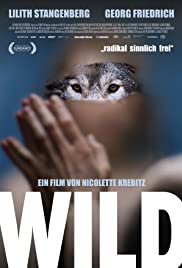
WILD
Germany, 2016, 97 minutes, Colour.
Lilith Stangenberg, Georg Friedrich.
Directed by Nicolette Krebitz.
Wild is a confronting German film. The title refers to the central character, Ania, as well as to a wolf.
The first part of the film establishes Ania as a character, living alone, reclusive, relating with her sister and visiting her ill grandfather in hospital. She works in an office, relates well enough to fellow workers who invite her out, rather reluctantly, to parties. There is ambiguity in her relationship with one of her bosses, Boris, played by Georg Friedrich, who flirts, expects her to bring him coffee, gets her to pick up material because he has lost his driving license.
However, the most part of the film concerns Ania’s relationship with a wolf that she sees by chance at the edge of the woods. She researches wolves, learns all about them, buys meat to feed the wolf, buys pet rabbits and sets them loose, finding one of them dead and so continuing to pursue the wolf, engaging her friends with material to set up a location to trap him. She injects him, takes him home.
The film dramatises its point in showing Ania becoming more feral, lustful, including intimacy with the wolf itself. She feeds it, yet imprisons it, her landlady complaining about mess and smell. Feeling more freed at work and defying people, she has a lustful interlude with Boris as well.
While only and does have some control, she also loses control of herself, letting her feral nature and wildness surface with some devastating results – but also indulging in her sense of wild freedom.
Not a film for every audience but a questioning about humans and their animal nature, control and giving up control.